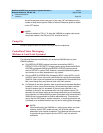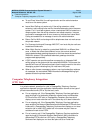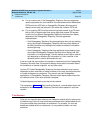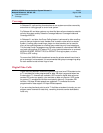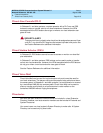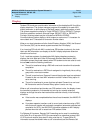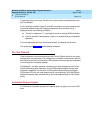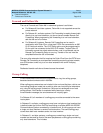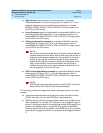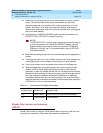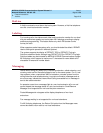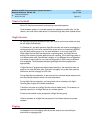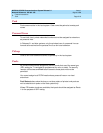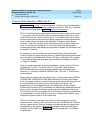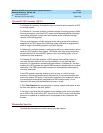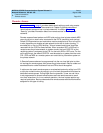
MERLIN LEGEND Communications System Release 6.1
Network Reference
555-661-150
Issue 1
August 1998
Feature Interactions
Page 3-14Group Calling
3
■ Night Service coverage across a private network to a centralized
Automated Attendant, non-local calling group, QCC queue, DLC, or any
individual extension such as a night bell or an extension on a remote
MERLIN LEGEND, DEFINITY ECS or DEFINITY ProLogix system, or to
the PSTN via UDP routing.
■ Group Coverage across a private network to a centralized VMS/AA, non-
local calling group, QCC queue, DLC, or any individual extension on a
remote MERLIN LEGEND, DEFINITY ECS or DEFINITY ProLogix system,
or to the PSTN via UDP routing.
■ Calling group overflow coverage to a centralized VMS/AA, non-local
calling group, QCC queue, DLC, or any individual extension within a
remote MERLIN LEGEND, DEFINITY ECS or DEFINITY ProLogix system,
or to the PSTN via UDP routing.
NOTE:
Be sure that overflow coverage does not go back and forth between
systems because facilities will be tied up. Each leg of the call ties up
a tandem trunk because release link is not provided. For example:
System A calling group overflows to System B calling group and
System B calling group overflows to system A calling group. In this
case, if both are busy, the calls bounce back and forth tying up
facilities along the way until an agent becomes available on one of
the calling groups or all trunks are busy.
■ QCC Position Busy Backup coverage to a centralized VMS/AA, remote
calling group, QCC queue, DLC, or any individual extension within a
remote MERLIN LEGEND, DEFINITY ECS or DEFINITY ProLogix system,
or to the PSTN via UDP routing.
NOTE:
VMS transfer returns are delivered only to the first QCC and will not
be sent to the QCC Position Busy Backup destination.
The following considerations apply when using a calling group with a non-local
member:
■ If the pattern associated with the calling group has a route that includes
PSTN trunks, each call over the PSTN has an associated cost.
■ SMDR records for calls sent across a private network may be different from
what is expected. For example, UDP calling may not be logged for part of
the call. If a call from system A is routed through system B to system C and
system A has SMDR turned on to log UDP calls, system B has SMDR
turned off to log UDP calls and system C has SMDR turned on to log UDP
calls, the call is logged at system A, not at system B and logged at system
C.



